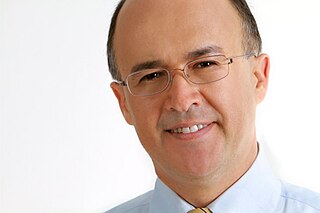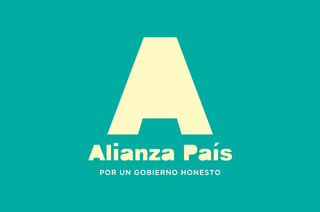
The Dominican Republic is a representative democracy, where the President of the Dominican Republic functions as both the head of the government and head of the multi-party system. Executive power is exercised by the government. Legislative power is vested in the bicameral National Congress. The Judiciary is independent of the executive and the legislature.
An identity document is any document that may be used to prove a person's identity. If issued in a small, standard credit card size form, it is usually called an identity card, or passport card. Some countries issue formal identity documents, as national identification cards that may be compulsory or non-compulsory, while others may require identity verification using regional identification or informal documents. When the identity document incorporates a person's photograph, it may be called photo ID.

The Social Christian Reformist Party is a Christian democratic right-wing political party in the Dominican Republic. It was established on July 24, 1984, by the union of Joaquín Balaguer's Partido Reformista and the Partido Revolucionario Social Cristiano. Some of the PRSC's founders and leaders were originally business leaders and Roman Catholics who opposed the communist, socialist, and social democratic tendencies of Juan Bosch, the Dominican Revolutionary Party (PRD) and the Dominican Liberation Party (PLD).

The Dominican Republic is a unitary state with elected officials at the national and local levels. On a national level, head of state, the President, is elected directly by the people. All members of a national legislature, The Congress of the Republic divided in two chambers. The Chamber of Deputies and the Senate. There are also elected offices at the local level. It is estimated that across the whole country, over four thousand offices are filled in every electoral cycle.

The Dominican Republic competed at the 1992 Summer Olympics in Barcelona, Spain.

Francisco Javier Tadeo Domínguez Brito is a Dominican lawyer and politician.
Victor Hipolito Sanchez Feliz former congressman, representing the Province of Azua, In the Dominican Republic. He was born on March 23, 1966. He is the son of civics professor Mr. Tirso Sanchez (deceased) and Mrs. Altagracia Millenia Feliz.
Juliana Deguis Pierre is a Haitian-Dominican woman, who was the plaintiff in the landmark Dominican lawsuit against the civil registry authority of the Dominican Republic which ruled that people born to illegal parents never had any right to the Dominican citizenship by birth. Deguis applied to the Special Naturalization Amnesty and on August 1, 2014 she acquired the Dominican Republic citizenship.

General elections were held in Dominican Republic on 15 May 2016 to elect a president, vice-president and the Congress, as well as 20 deputies to the Central American Parliament, municipal councils, mayors and vice mayors. On 15 May 2015 Roberto Rosario, president of the Central Electoral Board, said that there would be about 4,300 seats up for election in the "most complex elections in history".
Alba María Antonia Cabral Cornero, known as Peggy, is a Dominican journalist, television host, politician and diplomat. Cabral was co-president of the Dominican Revolutionary Party from 2013 to 2020; she also was vice-mayor of the National District (1998–2002). She served as Vice-Minister of Foreign Affairs of the Dominican Republic from 2019 to 2020. She is José Francisco Peña Gómez's widow.

The Dominican national identity card is a polycarbonate card containing the holder's full name, place of birth, date of birth, nationality, sex, civil status, occupation, polling station, and residential address, as well as a photograph that adheres to ISO/IEC 19794-5. The card can also optionally include the holder's blood type. Formerly, it included the holder's race.

The Civic Renovation Party is a political party in the Dominican Republic which was founded in 2006 as the Civic Renovation Movement by Jorge Radhamés Zorrilla Ozuna and a group of social-democratic Dominicans. The party was recognized by the Junta Central Electoral on December 16, 2009 and participated in the 2012 presidential elections, supporting Dominican Liberation Party candidate Danilo Medina through the Purple Alliance.

The Country Alliance is a political party in the Dominican Republic founded in 2011 by Guillermo Moreno and other citizens.

General elections were held in the Dominican Republic on 5 July 2020 to elect a president, vice-president, 32 senators and 190 deputies. They had originally been planned for 17 May, but were postponed due to the coronavirus pandemic. They are the second elections since 1994 in which all positions will be elected simultaneously, and the first in Dominican history in which all authorities will be elected simultaneously and directly.

Municipal elections were held in the Dominican Republic on February 16, 2020, to elect all local governments officials in the country, including mayors, deputy mayors, aldermen, directors, deputy directors, and voices in municipalities. However, due to countless electoral polling places reporting problems with the electronic voting system within the first few hours of opening the polls, the Central Electoral Board decided to suspend the elections. The elections were rescheduled to March 15, 2020.

The 2020 protests in the Dominican Republic, also known as the youth movement, comprise a series of massive congregations, both in the Dominican Republic and internationally, which took place from Sunday, February 16 to Thursday, March 12. of 2020, as a result of the Central Electoral Board suspending municipal elections for the first time in the entire history of national democracy. This decision was due to "errors" presented by electronic voting in the polling stations of 18 municipalities of the country, during the elections, in which around 62% of the votes were concentrated, despite the fact that manual votes, which were also applied in those demarcations, were being carried out without problems.

Socorro Sánchez del Rosario was a Dominican educator and journalist. She was the first feminist journalist of the country. She also founded the first secular coeducational school in the Dominican Republic, as well as the first women's library, first women's normal school and first women's pharmacy training courses. There are several schools in the country which have been named after her.
Aída Mercedes Batlle Morell de Bonnelly was a Dominican public figure and wife of former President Rafael Filiberto Bonnelly. She served as the First Lady of the Dominican Republic from January 18, 1962, to February 27, 1963. Battle was the great-granddaughter of Ulises Francisco Espaillat, another former Dominican president.












